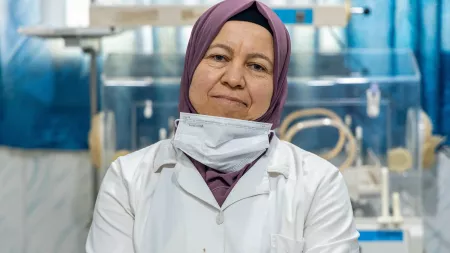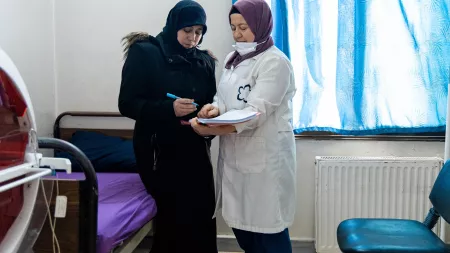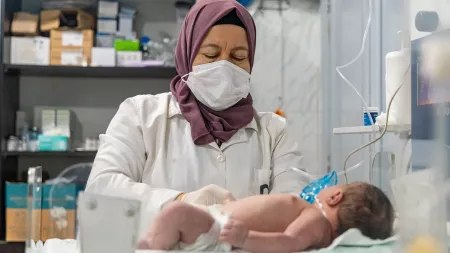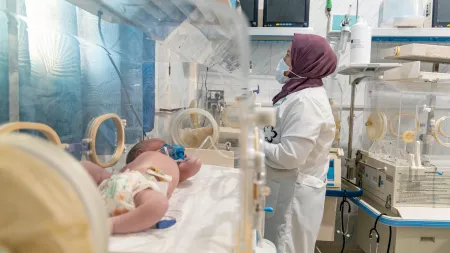After nearly fourteen years of civil war, the fall of the Assad regime has brought renewed hope for peace and freedom to many Syrians. People are waiting to turn the page and rebuild their lives. However, the situation remains fragile. The war has devastated the country and left deep scars on the Syrian society. Millions remain displaced, and the humanitarian crisis continues to take a heavy toll, particularly on women and children. What has changed?
To better understand the current realities for displaced women, we spoke with Samah*, a 45-year-old nurse working in the neonatal unit at Al-Amal Hospital operated by leading Syrian NGO Violet and funded by CARE in northwest Syria.

Married with three children, Samah lives with her family in a modest home, facing the daily hardships of displacement, and like many others, struggling to make ends meet.
I used to have a home and a stable life, but now we live under tough circumstances and face many challenges”Samah, mother of 3, nurse in Al-Amal Hospital, Northern Syria
"I am displaced like many others here. I fled with my family because of the war and moved to Ariha. I used to have a home and a stable life, but now we live under tough circumstances and face many challenges”, she says, noting that not much has changed despite the recent political developments.
“I continue to begin my day early in the morning, preparing to go to work and packing my essential items. I see my job as an opportunity to bring smiles to mothers' faces. Life is not easy here, and work is not easy either. In the neonatal unit, we care for many infants born under difficult circumstances. Shortages of medications and supplies remain a challenge, but we know these tiny lives depend on us.

Mothers here suffer immensely due to the lack of proper healthcare. Many face complications during pregnancy and childbirth. Without adequate medical facilities or supplies, the risks are severe.
I’ve witnessed cases of death due to delayed treatment or lack of equipment. Words cannot describe the sorrow we feel when we lose a mother or a child because of inadequate care. But there are also moments of joy when we manage, despite the difficulties, to save a life. I recall one case vividly. A mother from a camp experienced complications during pregnancy and was undergoing an early delivery. She arrived at the hospital very late, but we managed to save both her life and her baby’s.

I took care of the baby, providing the necessary care and treatment, while the doctors performed the required procedures for the mother until her condition stabilized. It was an incredible achievement, and it is cases like this what gives us motivation to go on.
This moment was a powerful reminder of how every second counts in healthcare.
Girls here lack awareness about reproductive health, leaving them vulnerable to gynecological diseases. Syrian women and girls suffer deeply, living in camps with unhygienic conditions, overcrowding, and malnutrition. These struggles, combined with psychological trauma from war and displacement, exacerbate their mental and physical health problems and we must not forget that these challenges persist.
My greatest wish is for everyone to finally have access to the healthcare they need without barriers. I dream of a future where mothers and girls no longer suffer from inadequate health services or economic hardships. I hope for Syria where we can rebuild our homes, schools, hospitals, and roads, and where people have opportunities to earn a living. Returning to our homes is not just an emotional need; it is essential for our dignified living.
Returning to our homes is not just an emotional need; it is essential for our dignified living."Samah, mother of 3, nurse in Al-Amal Hospital, Northern Syria
I wish I could return to my city and home, where I could live peacefully with my family and friends. But the painful reality is that returning home is not an option right now. Many displaced people wish to return to their homes, but the conditions are not suitable for living. The war has destroyed much of the infrastructure, and the lack of livelihood opportunities and an unstable security situation makes it impossible.
People need hope and an environment where they can rebuild their lives. This requires significant support from humanitarian organizations. Apart from rebuilding essential infrastructure, there is a dire need for more medical equipment, medications, clean water, and electricity, in addition to job opportunities. People need chances to earn a living. When healthcare, social, economic, and livelihood support is provided, we will have the ability to return to our homes and reclaim our lives.
Syria still needs your support. Every contribution matters”.
*Name changed to protect identity.
Notes to editors:
Al-Amal Hospital in Aleppo, is supported by CARE through comprehensive funding from the government of Germany for its operational costs, including rent, medical equipment, medicine, and staff salaries. The hospital is run by Violet, a leading Syrian NGO that has been at the forefront of the humanitarian response in Syria since 2013 and that CARE is proud to fund as a specialist implementing partner.
Al Amal Hospital in numbers: In 2024, the hospital provided 47,065 maternal and pediatric health services to women and children through outpatient and in-patient consultations. The gynecology in-patient department provided medical services to 3,150. The total number of deliveries was 2,597. The gynecology outpatient clinic provided 12,912 reproductive health (RH) consultations, disaggregated to 8,749 Antenatal Care (ANC), 189 Postnatal Care (PNC), 684 Family Planning, and 3,290 other reproductive health (RH) consultations. The pediatric outpatient clinics provided consultations to 22,444.
For media inquiries, please contact: [email protected].
